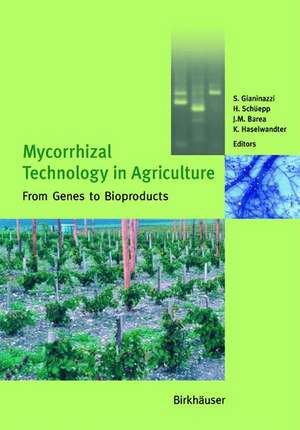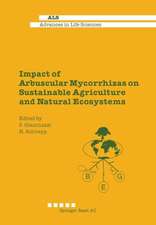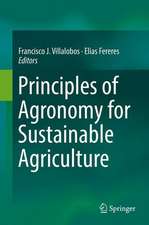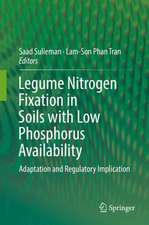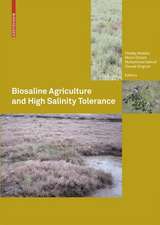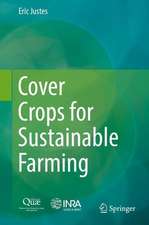Mycorrhizal Technology in Agriculture: From Genes to Bioproducts
Editat de S. Gianinazzi, Hannes Schüepp, J.M. Barea, K. Haselwandteren Limba Engleză Hardback – aug 2002
| Toate formatele și edițiile | Preț | Express |
|---|---|---|
| Paperback (1) | 788.20 lei 38-44 zile | |
| Birkhäuser Basel – 23 oct 2012 | 788.20 lei 38-44 zile | |
| Hardback (1) | 951.47 lei 6-8 săpt. | |
| Birkhäuser Basel – aug 2002 | 951.47 lei 6-8 săpt. |
Preț: 951.47 lei
Preț vechi: 1160.32 lei
-18% Nou
Puncte Express: 1427
Preț estimativ în valută:
182.09€ • 189.40$ • 150.32£
182.09€ • 189.40$ • 150.32£
Carte tipărită la comandă
Livrare economică 12-26 aprilie
Preluare comenzi: 021 569.72.76
Specificații
ISBN-13: 9783764364854
ISBN-10: 3764364858
Pagini: 316
Ilustrații: XV, 296 p.
Dimensiuni: 155 x 235 x 23 mm
Greutate: 0.62 kg
Ediția:2002
Editura: Birkhäuser Basel
Colecția Birkhäuser
Locul publicării:Basel, Switzerland
ISBN-10: 3764364858
Pagini: 316
Ilustrații: XV, 296 p.
Dimensiuni: 155 x 235 x 23 mm
Greutate: 0.62 kg
Ediția:2002
Editura: Birkhäuser Basel
Colecția Birkhäuser
Locul publicării:Basel, Switzerland
Public țintă
ResearchCuprins
The rhizosphere of mycorrhizal plants.- Arbuscular mycorrhizal fungi and soil bacteria: from cellular investigations to biotechnological perspectives.- Bases of the obligate biotrophy of arbuscular mycorrhizal fungi.- Arbuscular mycorrhizal fungal mycelium: from germlings to hyphal networks.- Biolistic transformation of arbuscular mycorrhizal fungi: advances and applications.- Arbuscular mycorrhizal modifications to plant root systems: scale, mechanisms and consequences.- Plant genes involved in arbuscular mycorrhiza formation and functioning.- Plant defense responses induced by arbuscular mycorrhizal fungi.- Arbuscular mycorrhiza induced ATPases and membrane nutrient transport mechanisms.- Arbuscular mycorrhizal fungi nitrate assimilation: Genes and ecophysiological aspects.- An ecological point of view on arbuscular mycorrhiza research.- Arbuscular mycorrhizal fungi, an essential component of soil microflora in ecosystem restoration.- Application of arbuscular mycorrhizal fungi in the revegetation of desertified Mediterranean ecosystems.- Potential of arbuscular mycorrhizal fungi for bioremediation.- The contribution of arbuscular mycorrhizal fungi to the control of soil-borne plant pathogens.- Mycorrhization as a stress adaptation procedure.- Arbuscular mycorrhizal fungi in low input agriculture.- Arbuscular mycorrhizal fungi and micropropagation of high value crops.- Ecological considerations for successful application of arbuscular mycorrhizal fungi inoculum.- Selecting arbuscular mycorrhizal fungi for field application.- Directed inoculum production — shall we be able to design populations of arbuscular mycorrhizal fungi to achieve predictable symbiotic effectiveness?.- Quality control of arbuscular mycorrhizal fungi inoculum in Europe.
Caracteristici
THE VOLUME REPRESENTS AN INTEGRATE DEMONSTRATION THAT AM SYMBIOSIS IS A CRUCIAL COMPONENT TO ASSURE PLANT HEALTH AND PRODUCTIVITY AND SOIL QUALITY WIDELY DISCUSSES THE POSSIBILITIES OF TECHNOLOGY TRANSFER OF AM INTO COMMERCIAL PRACTICES PUTS SPECIAL EMPHASIS ON PROBLEMS LINKED TO QUALITY INOCULUM PRODUCTION AND USE PRESENTS SUCCESSFUL EXAMPLES OF THE INTRODUCTION OF AM FUNGI INTO PLANT PRODUCTION SYSTEMS
